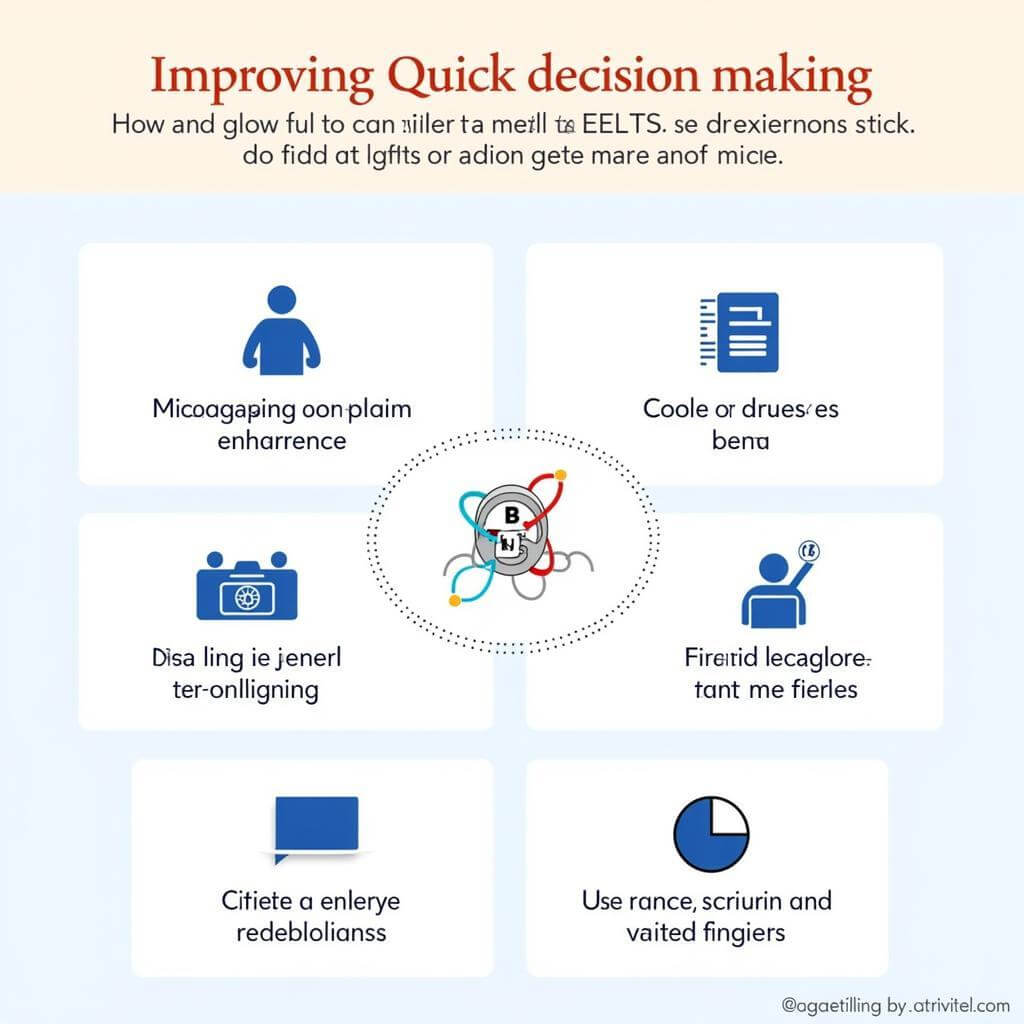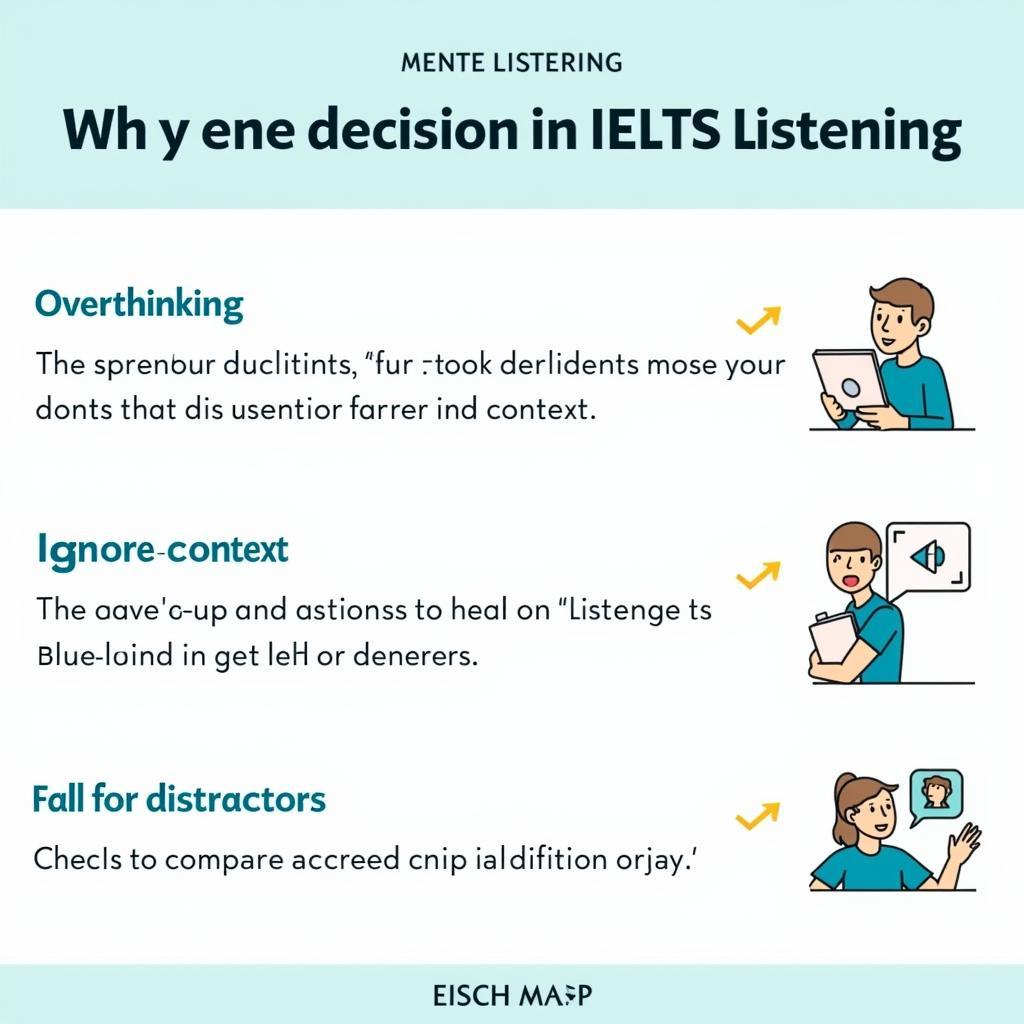In the IELTS Listening test, quick decision-making is a crucial skill that can significantly impact your score. The ability to rapidly process information and choose the correct answer is essential, given the fast-paced nature of the audio recordings. This article will explore effective strategies to enhance your quick decision-making abilities and boost your performance in the IELTS Listening module.
Understanding Quick Decision-Making in IELTS Listening
Quick decision-making in IELTS Listening involves rapidly analyzing the audio input, identifying key information, and selecting the appropriate answer within a limited time frame. This skill is particularly important when dealing with multiple-choice questions, matching exercises, and fill-in-the-blank tasks.
How to choose flooring materials ielts listening answers can be challenging, but with proper techniques, you can improve your quick decision-making skills and tackle such questions effectively.
Examples of Quick Decision-Making Scenarios
- Choosing between similar-sounding words (e.g., “affect” vs. “effect”)
- Identifying the correct spelling of names or places
- Selecting the appropriate answer from multiple options
- Determining the correct tense or grammatical form
- Recognizing synonyms or paraphrased information
- Interpreting numbers, dates, and times accurately
- Distinguishing between main ideas and supporting details
Strategies to Improve Quick Decision-Making
1. Develop Active Listening Skills
Active listening involves fully concentrating on the audio, understanding the message, and responding thoughtfully. To improve this skill:
- Practice focusing on the speaker’s tone, emphasis, and pace
- Anticipate possible questions based on the context
- Take concise notes to support your memory
2. Enhance Your Vocabulary
A strong vocabulary enables faster comprehension and decision-making. To expand your word bank:
- Learn common IELTS topics and related vocabulary
- Study synonyms and antonyms
- Practice using new words in context
3. Improve Your Prediction Skills
Predicting possible answers can speed up your decision-making process. To enhance this ability:
- Read questions before the audio begins
- Anticipate potential answers based on the question type
- Consider logical connections between questions and answers
 IELTS Listening Quick Decision-Making Strategies
IELTS Listening Quick Decision-Making Strategies
4. Practice Time Management
Effective time management is crucial for quick decision-making. To improve your timing:
- Allocate specific time limits for each question type
- Practice with timed mock tests
- Learn to move on quickly if you’re unsure about an answer
5. Familiarize Yourself with Question Types
Understanding different question formats allows for faster processing. Common IELTS Listening question types include:
- Multiple choice
- Matching
- Plan, map, and diagram labeling
- Form, note, table, flow-chart, and summary completion
- Sentence completion
- Short answer questions
Applying Quick Decision-Making to IELTS Listening Tasks
Let’s explore how to apply these strategies to a typical IELTS Listening task:
Sample Question:
You will hear a radio interview about a new community garden project. Choose the correct letter, A, B, or C.
- The community garden project aims to:
A) Provide food for local restaurants
B) Educate children about gardening
C) Create a space for community gatherings
To make a quick decision:
- Read the question and options before the audio begins
- Listen actively for keywords related to the project’s purpose
- Eliminate incorrect options as you hear relevant information
- Choose the most appropriate answer based on the information provided
Common Mistakes in Quick Decision-Making
- Overthinking: Spending too much time on a single question
- Ignoring context: Failing to consider the overall topic or situation
- Misinterpreting synonyms or paraphrases: Not recognizing alternative expressions
- Falling for distractors: Choosing answers based on familiar words without full comprehension
- Neglecting to use elimination: Not crossing out unlikely options to narrow down choices
 Common Mistakes in IELTS Listening Quick Decision-Making
Common Mistakes in IELTS Listening Quick Decision-Making
Practice Exercises for Improving Quick Decision-Making
- Timed vocabulary matching: Match words with their definitions or synonyms within a set time limit
- Rapid response drills: Listen to short audio clips and answer questions immediately
- Multiple-choice speed tests: Complete multiple-choice questions with decreasing time limits
- Keyword identification exercises: Quickly identify key information in spoken sentences
- Synonym recognition practice: Listen to sentences and choose the correct synonym for highlighted words
Remember, improving your quick decision-making skills for IELTS Listening requires consistent practice and application of these strategies. As you work on enhancing these abilities, you’ll find that your confidence and performance in the test will improve significantly.
Conclusion
Mastering quick decision-making in IELTS Listening is a valuable skill that can dramatically improve your test performance. By implementing the strategies discussed in this article, such as developing active listening skills, enhancing your vocabulary, and practicing time management, you can boost your ability to make rapid, accurate choices during the exam.
Remember that consistent practice is key to improvement. Regularly engage with IELTS-style listening materials and challenge yourself with timed exercises to refine your quick decision-making abilities. With dedication and the right approach, you’ll be well-equipped to tackle the IELTS Listening test with confidence and achieve the score you desire.
We encourage you to share your experiences and any additional tips you may have for improving quick decision-making in IELTS Listening. Your insights could be invaluable to fellow test-takers. Don’t hesitate to explore other resources on our website to further enhance your IELTS preparation journey.


